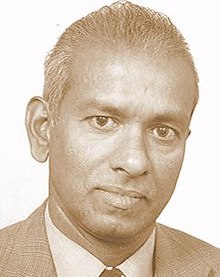Sinnappah Arasaratnam FAHA (20 March 1930 – 4 October 1998) was a Sri Lankan academic, historian and author, born during British colonial rule. Known as 'Arasa', he was a lecturer at the University of Ceylon, University of Malaya and University of New England (Australia).
S. Arasaratnam | |
|---|---|
 | |
| Born | 20 March 1930 |
| Died | 4 October 1998 (aged 68) |
| Alma mater | Jaffna College University of Ceylon University of London |
| Occupation | Academic |
Early life and family
editArasaratnam was born on 20 March 1930 in Navaly in northern British Ceylon.[1] He was educated at Jaffna College, Vaddukoddai.[2] After school he joined the University of Ceylon in 1947 from where he graduated in 1951 with a First Class Honours BA degree.[1][2]
Arasaratnam married Thanalakshmi (Padma), daughter of Selvathurai. They had two daughters (Sulochana and Ranjana) and a son (Niranjan).[2] Arasaratnam was a practising Christian who attended the Uniting Church in Armidale, New South Wales.[1]
Career
editAfter graduation in 1951 Arasaratnam was appointed an assistant lecturer of history at the University of Ceylon.[1][2] In 1954 he joined the University of London to carry out doctoral research and in 1956 he graduated with a Ph.D in history.[1][2] On returning to Ceylon Arasaratnam rejoined the University of Ceylon as a lecturer.[1][2] He was appointed lecturer in Indian Studies at the University of Malaya in 1961.[1] He was promoted to professor of history in 1968.[1][2]
Arasaratnam was appointed second professor in the Department of History at the University of New England (Australia) in 1972.[1][2] He took up the post in 1973. He held the Smuts Fellowship in Commonwealth Studies, Cambridge in 1977.[1] Arasaratnam retired from the University of New England in March 1995.[1] He was elected a Fellow of the Australian Academy of the Humanities in 1996.[3]
Death
editArasaratnam died suddenly in Sydney, Australia on 4 October 1998.[1] He was 68.
Works
editArasaratnam was prolific writer — he wrote 15 books and 93 articles/chapters.[1][4] His literary works were achieved while heavily engaged with activities such as sitting on key bodies such as the Academic Advisory Committee.[5]
- Dutch Power in Ceylon, 1658-1687 (1958, Netherlands Institute of Cultural Relations/Djambatan)
- Ceylon (1964, Spectrum/Prentice-Hall)
- Indian festivals in Malaya (1966, University of Malaya)
- Indians in Malaysia and Singapore. Kuala Lumpur: Oxford University Press. 1970. OCLC 6328370.
- Maritime India in the seventeenth century (1994, Oxford University Press) ISBN 978-0-86078-610-8[6]
- Ceylon and the Dutch, 1600-1800 (1996, Variorum) ISBN 978-0-86078-579-8
- Maritime commerce and English power (1996, Variorum)
References
edit- ^ a b c d e f g h i j k l m Beer, Don. "Obituary Emeritus Professor Sinnappah Arasaratnam". University of New England (Australia). Archived from the original on 11 March 2011.
- ^ a b c d e f g h Arumugam, S. (1997). Dictionary of Biography of the Tamils of Ceylon. p. 10.
- ^ Pearson, M N. "SINNAPPAH ARASARATNAM" (PDF). Australian Academy of the Humanities. Retrieved 22 April 2024.
- ^ "A Tribute to Three 'Golden Age' Dons with Great Respect". The Island, Sri Lanka. 10 May 2009.
- ^ Associate Professor Don Beer, Obitury, Australia in the University Newsletter, Volume 13 Number 19, 23 October 1998
- ^ Scholberg, Henry (February 1997). "Maritime Trade, Society and European Influence in Southern Asia, 1600-1800 by Sinnappah Arasaratnam; Maritime India in the Seventeenth Century by Sinnappah Arasaratnam". The Journal of Asian Studies. 56 (1): 219–220. doi:10.2307/2646395. JSTOR 2646395. S2CID 152418841.